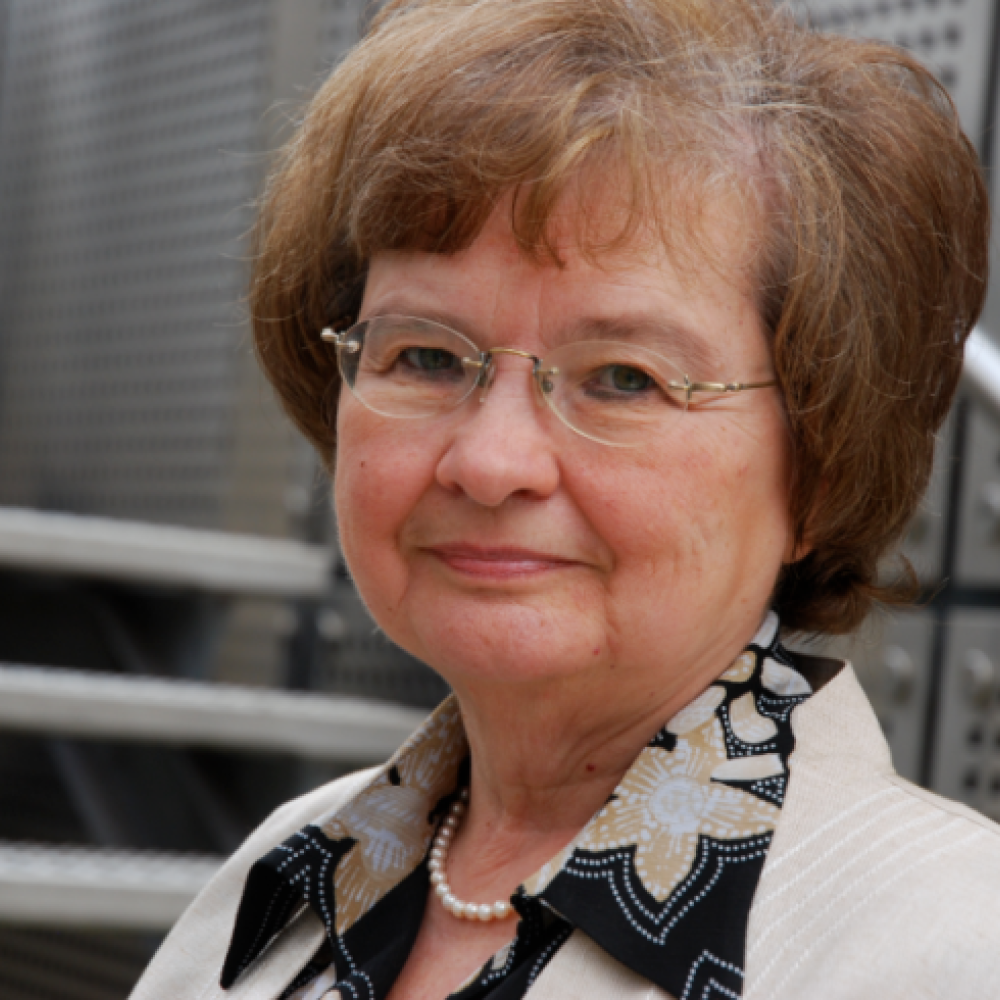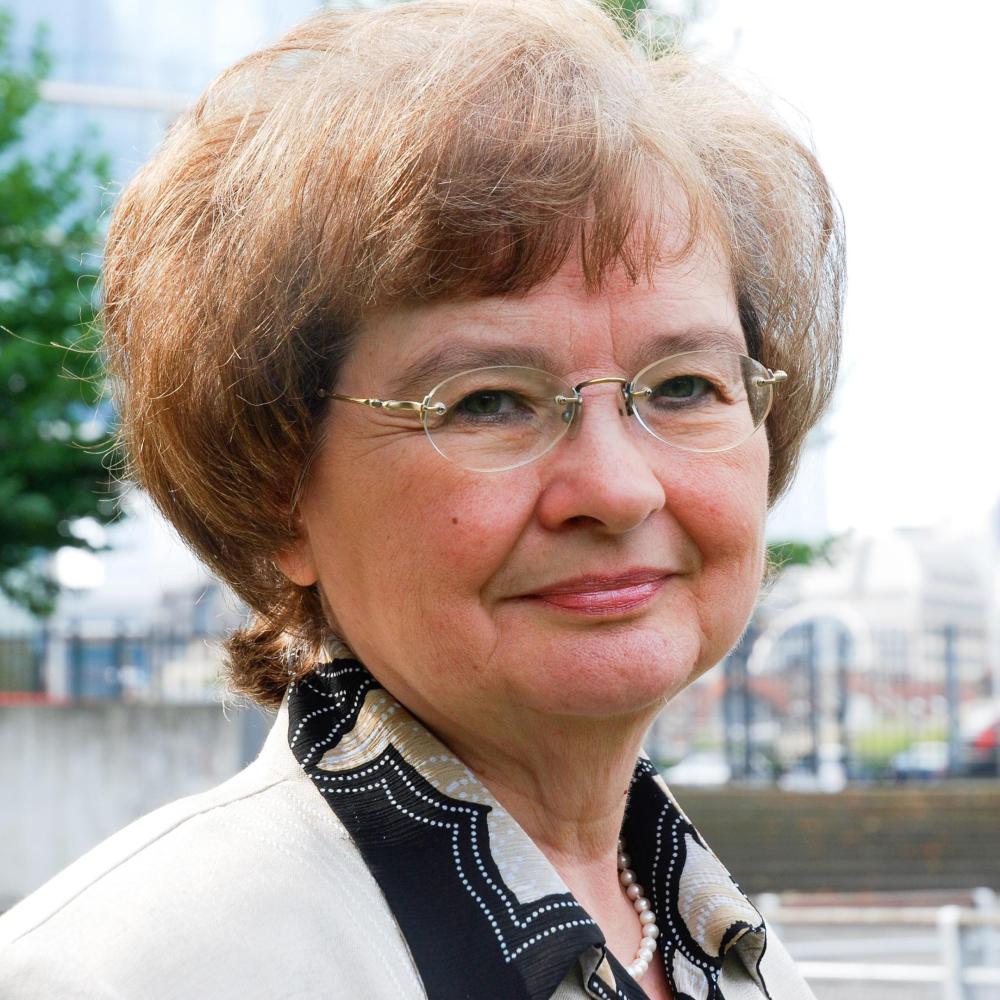
Bio/CV
Els Witte (born 30 September 1941) graduated from college in Laken and went on to earn a master’s in history from UGent. Shortly after, she became assistant to Jan Dhondt, founder of the study of contemporary history in Belgium. This would become Witte’s specialisation too. In 1973, she became a professor at the VUB and eventually the university’s first female rector.
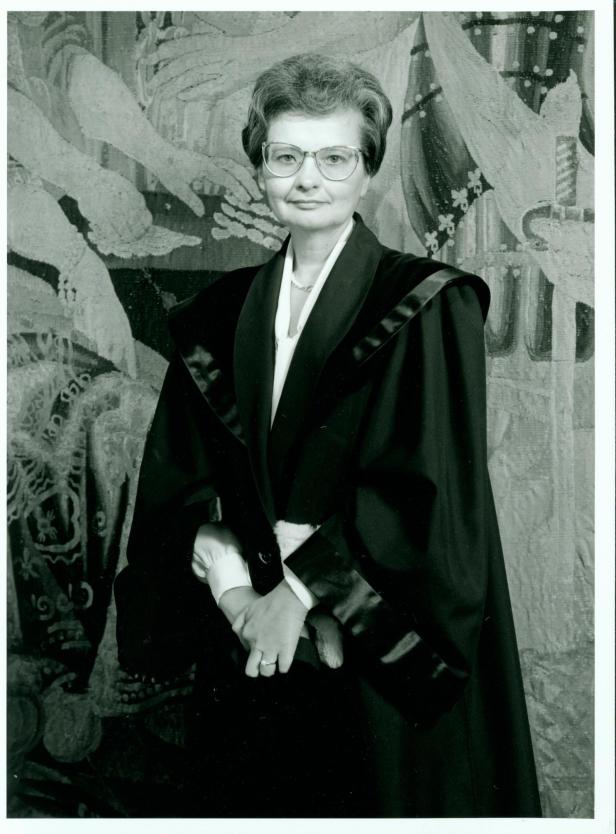
Els Witte in full costume as the new rector on 21 September 1994. (Photo: CAVA, Hilde Braet)
This portrait is partly based on the historical treatises and sources of the Centre for Academic and Liberal Archives (CAVA). The material can be found on their website.
Rectorship
Els Witte was the second female rector in Belgium and the first at the VUB. She was elected in 1994 at the time of a turbulent political climate in higher education and threats of cuts to the VUB as a Flemish university in Brussels. During her mandate, Witte emphasised the regional importance of her university for Flemish people in Brussels. She also focused strongly on collaborations with other universities and a number of interuniversity programmes were launched under her supervision. There were also collaborations beyond national borders. During her tenure, a strong international and European network was developed.
Dillemans report
In 1997, the Dillemans report on the future of Flemish universities was published. Els Witte strongly opposed the confederation of KU Leuven with the Catholic University of Brussels that was proposed in it. Her contention was that the VUB would lose students. The proposal was never realised.
Under her rectorship, Witte launched several initiatives such as VESPAO, the association for study and professionalisation of academic education. She also made the VUB available to Brussels communities by further developing the university library. Making the VUB a university for the widest and most diverse audience possible was important to her.
Second chance education and support for disadvantaged students
Besides liberal values, Witte also focused on the student as an individual and worked to develop second-chance education and support for socially disadvantaged students. She went against the exclusivity of higher education and opposed the knowledge society that the politics of the time tried to create. The debate surrounding the introduction of an admission test for the medical course is also situated in this context. During her tenure, the number of students increased significantly and she accused politicians of poor integration of lower socio-economic classes in university education.
She also worked to ensure that women were given equal opportunities and gender themes were developed academically. Although she never fully took up a political mandate, as rector she engaged in politics by expressing her opinions unflinchingly on important topics in university education and in the interests of her students. Moreover, she always continued to learn, even during her rectorship.
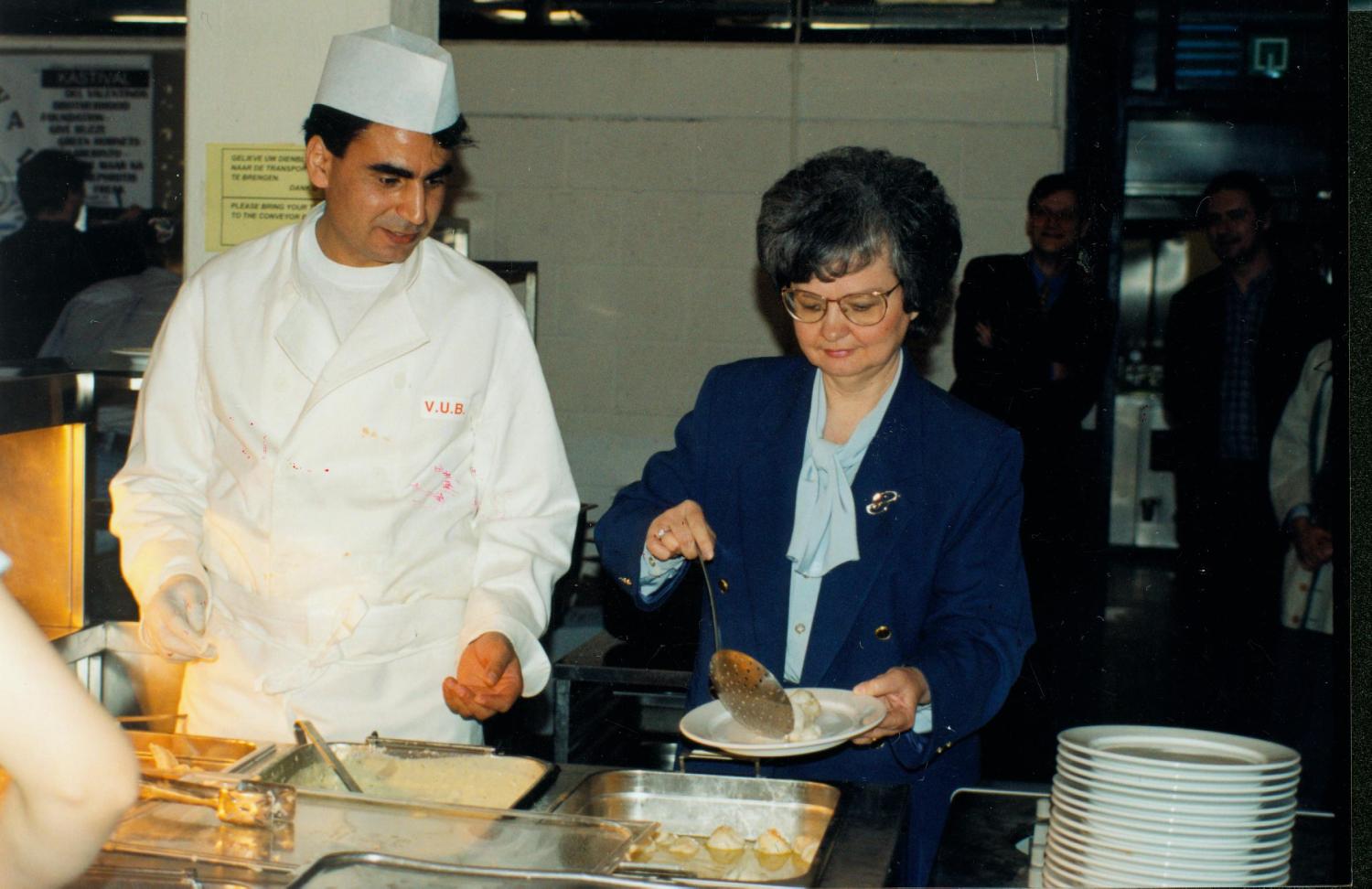
Revaluing humanism
For Els Witte, the university had a strong social function. During her tenure, she put the VUB on the map not only in Flanders but also at European level. She saw the university as a philosophical-social project that makes critical judgements free of dogmas. Human sciences were revalued and a number of innovative research areas received extra support. Moreover, attention was drawn to ethical debates such as euthanasia and abortion, which are crucial from a humanist point of view.
Her rectorship was a stressful period in her life and she hesitated for a long time before taking on a second term. She felt that she had too little time to carry out historical research. But out of love for the university, its students and her belief that she could make a difference as rector, she stood.
In essence, throughout her rectorship Witte was an advocate for the VUB as a growing and high-quality university for Flemish people in Brussels. She never lost sight of the social function of education as a springboard for social minority groups. She lived for “her VUB” and all “her students”.
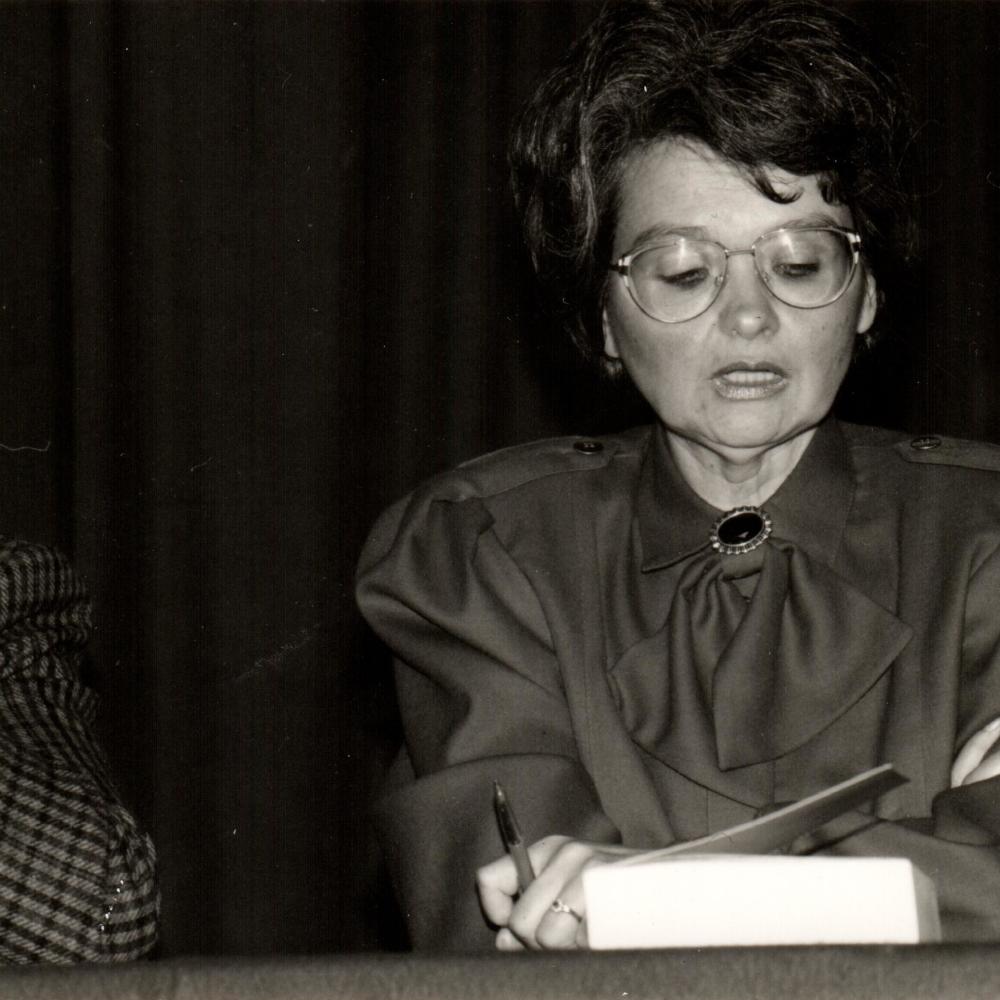
Chair of BRT
Els Witte was chair of the board of directors of public broadcaster BRTN between 1988 and 1994. She was there primarily as an academic but also as an expert in media and press history. Although she was nominated by socialist party SP, now Vooruit, while chair she tried to push politics into the background and speak with one voice as a public broadcaster, which had not been the case before. (Photo: CAVA)
Studies and career
Els Witte enjoyed her initial education at Laken. A basic knowledge of Greek and Latin was necessary to study history at university, but she had not studied these subjects in secondary school. Through the examination board, she was nevertheless accepted. For her master’s degree she went to Ghent University, where Prof Jan Dhondt became her supervisor. According to her, he was decisive for her further academic career. She started as assistant to Dhondt, considered the founder of the study of contemporary history in Belgium. This also became Witte’s specialisation, and in 1973, she became professor of contemporary history at the VUB. She became a professor at a time, she says, when there was a great need for academics.
Extensive social commitment
Els Witte was committed to various organisations and initiatives that were close to her heart. In 1976, she founded BRUT, the centre for interdisciplinary research on language in Brussels, through which she sought to address language issues in the city. Witte felt it was important for Flemish to be recognised as a language in Brussels. In 1987, she was a co-founder of VUBPress, which disseminated and popularised scientific knowledge. She was an editorial board member of Links, the magazine of the left wing of the SP, and stood in the municipal elections in Sint-Joost-ten-Node, which earned her a seat on the social welfare council. Until then, she had studied politics in the abstract, but this mandate gave her a very tangible experience of the problems in Brussels’ poorest municipality. She did not pursue her political career; in her own words, because local politics was too much about power.
Denunciation of gender inequality
Els Witte was a member of the Coudenberg group, a Belgian federalist think tank. She also took on the leadership of the Flemish institute of history, VIGES, which supported the publication of the National Biographical Dictionary, among other things.
From a political position with the SP, she served as chair of broadcaster BRTN’s board of directors. Again, this was accompanied by a turbulent period in the media landscape: 1989 saw the birth of the commercial channel VTM. Internal conflicts shifted into the background as the entire organisation suddenly had a common enemy. During and after her rectorship, she assumed the presidency of the Flemish Interuniversity Council, where she was able to address political challenges to education and denounce gender inequality in academia.
Historical research was central to Els Witte throughout her career. As rector, she was unable to make much time for it, which she regretted. After her retirement, she had time again and a number of publications followed.
Prizes and titles
Appointment as a baroness: On 24 April 1998, Els Witte was raised to the peerage with the title of baroness. She chose as her motto Memoria constans: Let us always remember.
On 17 September 2016, she was made an honorary member of Maatschappij der Nederlandse letterkunde. She owed this honour to her academic career, particularly in relation to Belgian political history, and her social engagement.
Visser-Neerlandiaprijs: In 2021, she received this recognition for her academic research on the United Netherlands, her commitment to Dutch-Flemish cooperation, such as in the position of president of the Flemish public broadcaster, and her efforts for the Dutch language in Brussels and in science.
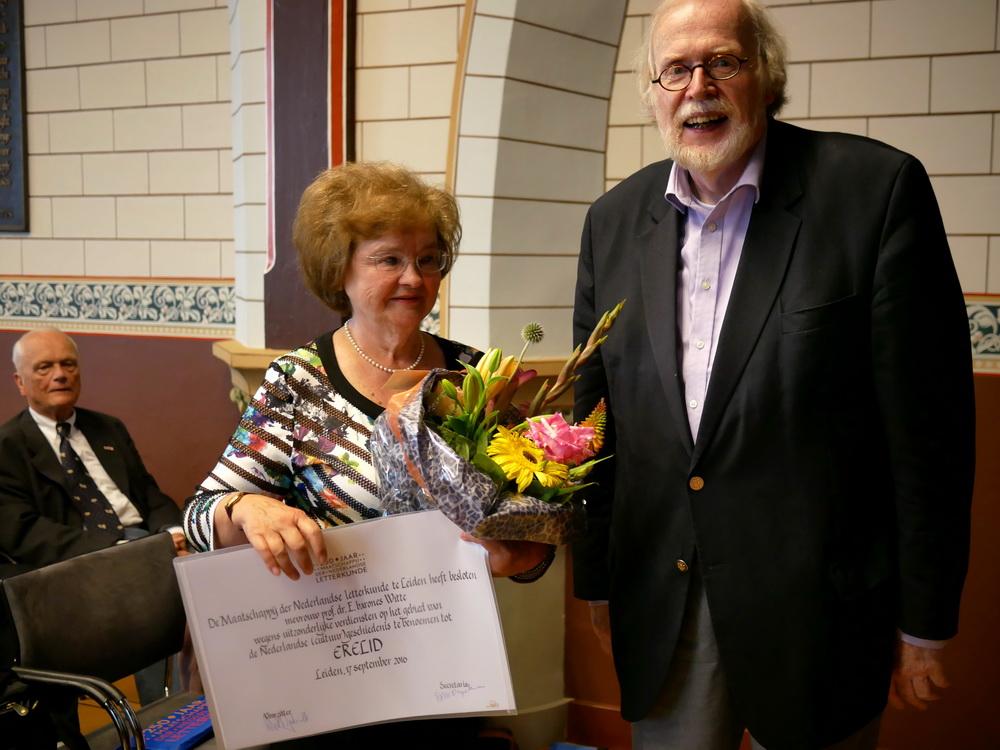
Els Witte is being honored as an honorary member of the Maatschappij der Nederlandse Letterkunde. The jury called her "A militant role model. (Photo: Harry Otto)
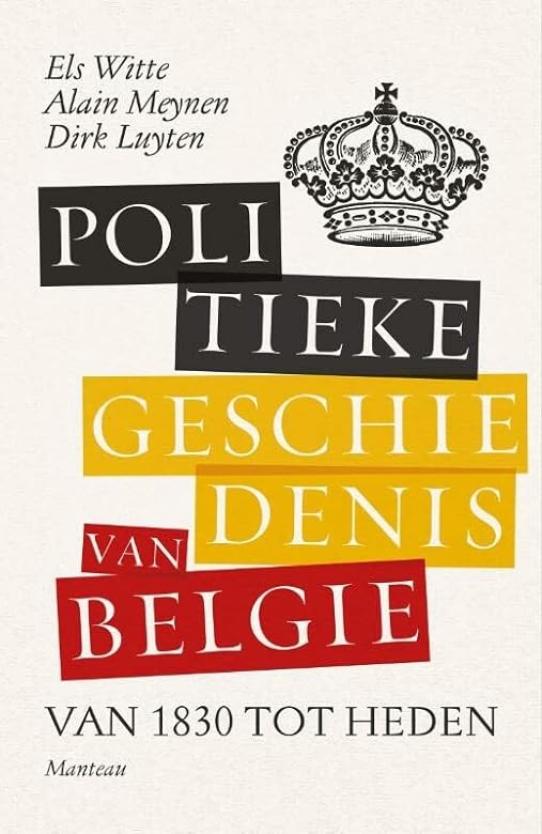
Publications
- Witte, Els. De specificiteit van het "verzuilingsproces" langs vrijzinnige zijde. De inbreng van de historische dimensie; vol. 13 Issue 1, 1982, 23-57.
- Witte, Els. De georganiseerde vrijzinnigheid: een einddoel?, De specificiteit van vrijzinnig humanistische waarden, Studiereeks Tijdschrift VUB, 24, VUB, Brussel, 1986.
- Witte, Els. Brieven en notities van Pierre-Théodore Verhaegen (1834-1854): een politiek-culturele lectuur. Het persoonlijke is politiek: egoducumenten en politieke cultuur.
- Witte, Els. De vrijzinnige traditie in België: van getolereerde tegencultuur tot erkende levensbeschouwing. VUBPress, Brussel, 1998
- Witte Els; Dirk Luyten; Alain Meynen, Politieke geschiedenis van België, van 1830 tot heden, 1990, Standaard Uitgeverij.
- Witte, Els. Herinneringen van een historica. Over Jaap Kruithof gesproken, VUBPress, Brussel, 1996.
- Witte, Els; Mares, An. Twintig jaar onderzoek over Brussel: studies naar aanleiding van 20 jaar wetenschappelijke productie van het VUB-Centrum voor de Interdisciplinaire Studie van Brussel, 1978-1998. VUBPress, Brussel, 1998.
- Witte Els, Twintig jaar politieke strijd rond de abortuswetgeving in België (1970-1990), Res Publica, vol.32, 4, 1990.
- Witte Els, Het Verloren Koninkrijk. Het harde verzet van de Belgische orangisten tegen de revolutie, 1828-1850, Antwerpen, 2014.
- Witte Els, Belgische republikeinen. Radicalen tussen twee revoluties (1830-1850), uitgeverij Polis, 2020.
